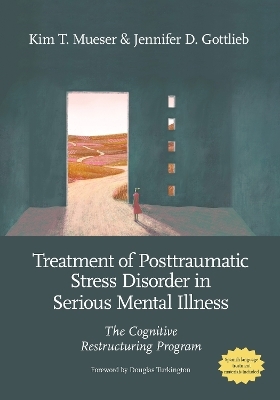
Treatment of Posttraumatic Stress Disorder in Serious Mental Illness
American Psychological Association (Verlag)
978-1-4338-4165-1 (ISBN)
- Noch nicht erschienen (ca. Dezember 2024)
- Versandkostenfrei innerhalb Deutschlands
- Auch auf Rechnung
- Verfügbarkeit in der Filiale vor Ort prüfen
- Artikel merken
This book is a practical guide to the evidence-based Cognitive Restructuring (CR) for PTSD program, which has been specifically designed to meet the unique needs of people with serious mental illness.
Posttraumatic stress disorder (PTSD) is very common among persons with serious mental illness (SMI). Unfortunately, it often leads to more severe psychiatric symptoms, greater impairment in psychosocial functioning, poorer physical health, and a higher use of acute care services among people with SMI. Yet despite major advances in the treatment of PTSD in the general population, PTSD has remained underdiagnosed and underaddressed among people with SMI, and treatments for this population have been relatively neglected.
This practical, hands-on guide gives clinicians the tools they need for screening, detecting, and treating PTSD in their clients with SMI, including schizophrenia, bipolar disorder, major depression, and borderline personality disorder. Chapters summarize research and theory regarding the interaction between PTSD and SMI, provide nuts and bolts strategies for implementing the authors' Cognitive Restructuring for PTSD program, and offer guidance for overcoming clinical challenges to trauma treatment such as psychotic symptoms, low distress tolerance, emotion dysregulation, hopelessness, and cognitive impairment. Chapters also feature in-session dialogues with case vignettes that follow three unique clients as they participate in the CR for PTSD program.
Appendix materials include handouts and worksheets for delivering the CR for PTSD program. More resources, including both English and Spanish language educational handouts and worksheets, can be found online (https://www.apa.org/pubs/books/treatment-posttraumatic-stress-disorder-serious-mental-illness).
Kim T. Mueser, PhD is a professor in the Departments of Occupational Therapy and Psychological and Brain Sciences at Boston University. He has published over 400 peer-reviewed articles, 100 book chapters, and 15 books primarily on psychosocial treatments for serious mental illness (SMI), and has given numerous conference presentations, workshops, and invited lectures in the U.S. and abroad. Dr. Mueser began adapting empirically supported treatment methods for PTSD in the general population to the SMI population in the late 1990s, which resulted in the first standardization and feasibility testing of the CR for PTSD program in the early 2000s, followed by randomized controlled trials evaluating the program. Jennifer D. Gottlieb, PhD is a diplomate in the Academy of Cognitive and Behavioral Therapies whose work has been dedicated to the development, evaluation, and implementation of effective psychotherapeutic interventions for persons with severe psychiatric conditions. She is a founding member and former president of the North America CBT for Psychosis Network (NACBTpN) and is affiliated with the Cambridge Health Alliance/Harvard Medical School. In addition to numerous publications and presentations related to cognitive behavioral therapies for psychosis and other serious mental illness, Dr. Gottlieb has focused on the Cognitive Restructuring for PTSD intervention for over 18 years, as both a coinvestigator and a program development consultant. She has provided extensive workshop training, clinical supervision, and treatment fidelity evaluation to hundreds of clinicians and has worked with multiple mental health agencies, nationally and internationally to implement and sustain this intervention (https://www.jennifergottliebphd.com).
Foreword
Preface
Part I: Background and Overview of Trauma and PTSD in Serious Mental Illness
Chapter 1. Trauma and PTSD in Serious Mental Illness
Chapter 2. Treatment of PTSD in People With Serious Mental Illness: The Cognitive Restructuring Program
Chapter 3. Understanding and Assessing Trauma and PTSD
Part II: The Cognitive Restructuring for PTSD Program
Chapter 4. Logistics of Implementing the CR for PTSD Program
Chapter 5. Beginning Treatment: Engagement, Orientation, Wellness Planning, and Breathing Retraining
Chapter 6. Psychoeducation and Goal-Setting
Chapter 7. Cognitive Restructuring I: The Thought-Feeling Model and Common Styles of Thinking
Chapter 8. Cognitive Restructuring II: The 5 Steps of Cognitive Restructuring and Action Plans
Chapter 9. Cognitive Restructuring III: Working With Trauma-Related Thoughts, Core Beliefs, and Persistent PTSD Symptoms
Chapter 10. Solutions to Common Challenges
Chapter 11. Skill Generalization and Termination
Part III: Special Clinical Challenges and Populations
Chapter 12. Working With People With Psychosis
Chapter 13. Working With People With Borderline Personality Disorder
Part IV: Conclusion
Chapter 14: The Role of the CR for PTSD Program in a Comprehensive System of Mental Health Care
Appendix: Clinician Tools and Handouts
References
| Erscheint lt. Verlag | 24.12.2024 |
|---|---|
| Verlagsort | Washington DC |
| Sprache | englisch |
| Maße | 178 x 254 mm |
| Themenwelt | Geisteswissenschaften ► Psychologie ► Allgemeine Psychologie |
| Geisteswissenschaften ► Psychologie ► Biopsychologie / Neurowissenschaften | |
| Geisteswissenschaften ► Psychologie ► Klinische Psychologie | |
| Geisteswissenschaften ► Psychologie ► Verhaltenstherapie | |
| ISBN-10 | 1-4338-4165-7 / 1433841657 |
| ISBN-13 | 978-1-4338-4165-1 / 9781433841651 |
| Zustand | Neuware |
| Informationen gemäß Produktsicherheitsverordnung (GPSR) | |
| Haben Sie eine Frage zum Produkt? |
aus dem Bereich


